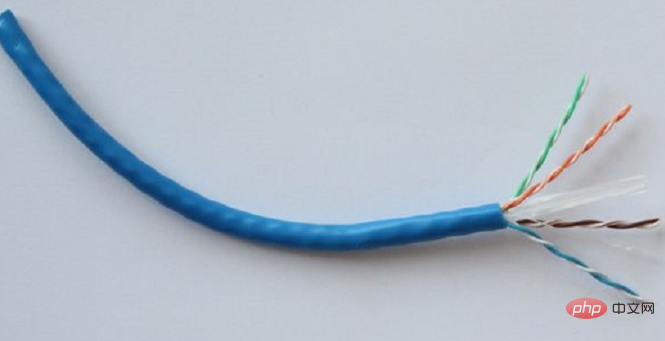What types of network cables are hsyv-6?
"hsyv-6" is Category 6 twisted pair (network cable); hsyv means twisted pair, and "6" means CAT6, which is Category 6. Category 6 network cable supports up to Gigabit network , is an upgraded version of 100M Category 5 network cable. Category 6 twisted pair has certain differences in appearance and structure from Category 5 or Category 5e twisted pair. It not only adds an insulated cross skeleton, but also adds The four pairs of wires are placed in the four grooves of the cross frame, and the diameter of the cable is also thicker.

The operating environment of this tutorial: Windows 10 system, DELL G3 computer.
hsyv-6 is a category of network cable
hsyv-6 is a category six twisted pair (network cable). Among them, hsyv means twisted pair, and 6 means CAT6 (Category 6). Category 6 network cable supports up to Gigabit network and is an upgraded version of 100M Category 5 network cable.

The shape and structure of Category 6 twisted pair cables are somewhat different from those of Category 5 or Category 5e twisted pairs. It not only adds an insulating cross skeleton, The four pairs of twisted pairs are placed in the four grooves of the cross frame, and the diameter of the cable is also thicker.
In addition, the premise of a Gigabit network is that the lines through which data packets pass, including switches and routers, must support Gigabit, otherwise the Gigabit function will not be achieved. For example, if the router outlet is 100M (100M), even if the port is connected to a Category 6 network cable, the maximum transmission speed is only 100M bandwidth.
HSYV-6 Category 6 network cable UTP-6HSYV-6 has greatly improved various parameters, and the transmission frequency has also been extended to 250MHz or higher. The shape and structure of Category 6 twisted pair are somewhat different from those of Category 5 or Category 5e. It not only adds an insulated cross frame, but also places the four pairs of twisted pairs on the four sides of the cross frame. groove, and the diameter of the cable is thicker.
HSYV-6 Category 6 network cable UTP-6HSYV-6 determines a new performance evaluation index. It uses single-core bare copper with specification 23AWG as the conductor, clustered polymer material as the insulator, and the outer sheath material is flame retardant. Polymer material, gray in color; the twisted pair meets the requirements of the specification (ISO/IEC), the electrical characteristics exceed the requirements of the Category 6 (Cat. 6) specification, and the cable center cross isolation ensures NEXT performance and reasonable construction bending radius. LSZH: stands for "low smoke and halogen-free". Low-smoke halogen-free materials can meet safety and environmental protection requirements.
HSYV-6 Category 6 network cable UTP-6HSYV-6 can be used for voice, integrated services data network (ISDN), ATM155Mbps and 622Mbps, 100MbpsTPDDI, Fast Ethernet and Gigabit Ethernet; better than Category 5 and Super 5 The class has the characteristics of long transmission distance, small transmission loss, wear resistance and pressure resistance. HSYV-6 Category 6 network cable UTP-6HSYV-6 HSYV-6 Category 6 network cable UTP-6HSYV-6 HSYV-6 Category 6 network cable UTP-6HSYV-6 HSYV-6 Category 6 network cable UTP-6HSYV-6
The difference between Category 5e and Category 6 lines
The identification of Category 5e line is "CAT5", with a bandwidth of 100M, suitable for networks below 100M; the identification of Category 5e line is "CAT5" CAT5E", with a bandwidth of 155M, is the main product; the Category 6 line is identified as CAT6, with a bandwidth of 250M, and is used to set up Gigabit networks, which is the future development trend.
"Category 5e" refers to Category 5e untwisted pair (UTP—Unshielded Twisted Pair). Untwisted pair cable is composed of multiple pairs of twisted pairs and a plastic sheath. Category 5 refers to five different quality levels for twisted pair cables defined by the Electrical Industry Association. Category 5e non-twisted pair cables are cables that appear after improving some of the performance of existing Category 5 twisted pair cables. Many Performance parameters, such as near-end crosstalk, attenuation crosstalk ratio, return loss, etc., have been improved, but its transmission bandwidth is still 100Mb/s.
The Category 5e twisted pair also uses 4 winding pairs and 1 tensile wire. The colors of the wire pairs are exactly the same as the Category 5 twisted pair, which are white-orange, orange, white-green, green, White-blue, blue, white-brown and brown. The bare copper wire diameter is 0.51mm (wire gauge is 24AWG), the insulated wire diameter is 0.92mm, and the UTP cable diameter is 5mm. Although Category 5e non-twisted pair cables can also provide transmission bandwidths up to 1000Mb/s, they often require the support of expensive special equipment. Therefore, it is usually only used in 100Mb/s Fast Ethernet to connect desktop switches to computers. If you are not planning to upgrade your network to Gigabit Ethernet in the future, you may wish to use Category 5e non-twisted pair cabling in horizontal cabling.
Usually, the twisting period of 4 pairs of twisted pairs is within 38.1mm, twisted in counterclockwise direction, and the twisted length of one pair is within 12.7mm.
HSYV-6 Category 6 network cable UTP-6HSYV-6 "Category 6" refers to Category 6 non-twisted pair: the parameters of Category 6 non-twisted pair have been greatly improved, and the bandwidth has been extended to 250MHz or higher. The shape and structure of Category 6 twisted pair are somewhat different from those of Category 5 or Category 5e. It not only adds an insulated cross frame, but also places the four pairs of twisted pairs on the four sides of the cross frame. groove, and the diameter of the cable is thicker. Category 6 non-twisted pair bare copper wire diameter is 0.57mm (wire gauge is 23AWG), insulated wire diameter is 1.02mm, and UTP cable diameter is 6.53mm.
For more relevant knowledge, please visit the FAQ column!
The above is the detailed content of What types of network cables are hsyv-6?. For more information, please follow other related articles on the PHP Chinese website!

Hot AI Tools

Undresser.AI Undress
AI-powered app for creating realistic nude photos

AI Clothes Remover
Online AI tool for removing clothes from photos.

Undress AI Tool
Undress images for free

Clothoff.io
AI clothes remover

AI Hentai Generator
Generate AI Hentai for free.

Hot Article

Hot Tools

Notepad++7.3.1
Easy-to-use and free code editor

SublimeText3 Chinese version
Chinese version, very easy to use

Zend Studio 13.0.1
Powerful PHP integrated development environment

Dreamweaver CS6
Visual web development tools

SublimeText3 Mac version
God-level code editing software (SublimeText3)

Hot Topics
 1377
1377
 52
52
 What network cable to use for 2.5g network port?
Mar 20, 2023 pm 02:09 PM
What network cable to use for 2.5g network port?
Mar 20, 2023 pm 02:09 PM
The 2.5g network port uses Category 5e network cables and can be connected to Gigabit network cables. The 2.5G port is a network interface with a rate of 2.5Gbps. The actual rate is usually calculated as 2500Mbps; and the Category 5e network cable (cat 5e) can fully meet the transmission requirements of 2.5Gbps and 1000Mbps. Category 5e unshielded twisted pair is a cable that has improved some of the performance of Category 5 shielded twisted pair. Many performance parameters, such as near-end crosstalk, attenuation to crosstalk ratio, return loss, etc., have been improved. But its transmission bandwidth is still 100MHz.
 What types of network cables are hsyv-6?
Jul 12, 2022 pm 02:03 PM
What types of network cables are hsyv-6?
Jul 12, 2022 pm 02:03 PM
"hsyv-6" is Category 6 twisted pair (network cable); hsyv means twisted pair, and "6" means CAT6, which is Category 6. Category 6 network cable supports up to Gigabit network, which is 100M Category 5 An upgraded version of the network cable, the Category 6 twisted pair is somewhat different from the Category 5 or Category 5e twisted pair in appearance and structure. It not only adds an insulated cross frame, but also separates the four pairs of twisted pairs. in the four grooves of the cross frame, and the diameter of the cable is also thicker.
 Is the Category 6e cable marked 6e or 6a?
Oct 28, 2022 pm 02:06 PM
Is the Category 6e cable marked 6e or 6a?
Oct 28, 2022 pm 02:06 PM
The logo of Category 6e network cable is 6a, and its complete logo is CAT6A; CAT6E is an improved version of CAT6, but not CAT6A; Category 6e network cable and Category 6 network cable generally have a cross skeleton with insulating effect added to the internal structure, and will Arrange 4 pairs of twisted pairs in the 4 grooves of the cross frame respectively. However, the cross frame inside the Category 6e network cable generally uses a gear-shaped cable trough shape, while the cross frame of the Category 6 network cable is generally a straight line. Isolated.
 What types of network cables are hsyv-5e?
Mar 06, 2023 pm 03:10 PM
What types of network cables are hsyv-5e?
Mar 06, 2023 pm 03:10 PM
hsyv-5e is a Category 5e network cable; hsyv represents the structure of the line, and 5e represents Category 5e. Its transmission frequency is as high as 100MHz. It is a Gigabit network cable and can be used in Gigabit networks, and the hsyv-5e center line The twist of the pair is denser, the signal transmission is faster, the quality is better, and the durability is better.
 What should I do if the network cable is plugged in but the network cannot be recognized?
Jul 05, 2023 pm 03:47 PM
What should I do if the network cable is plugged in but the network cannot be recognized?
Jul 05, 2023 pm 03:47 PM
There are three solutions to the problem that the network cable is plugged in but the network cannot be recognized: 1. Unplug the network cable and restart the router; 2. Press Win+X, select Settings, click Network and Internet, select Ethernet and click Change Adapter Options, click After selecting Disable Local Connection, click again to select Enable; 3. Click Status in the Network and Internet interface, then select Network Reset in the pop-up interface, click Reset Now, and then the computer will restart within 5 minutes to complete the reset.
 What kind of network cable is hsyu5e?
Oct 21, 2022 am 09:31 AM
What kind of network cable is hsyu5e?
Oct 21, 2022 am 09:31 AM
hsyu5e is a Category 5e twisted pair, which has the characteristics of small attenuation and less crosstalk, and has higher attenuation to crosstalk ratio (ACR) and signal to noise ratio (signal to noise ratio), smaller delay difference, high performance greatly improved. The transmission frequency of hsyu5e is as high as 100MHz. It is a Gigabit network cable and can be used in Gigabit networks. The twisting degree of the wire pairs in hsyv5e is relatively dense, so the signal transmission is fast, the quality is better, and the durability is better.
 4pairs are several types of network cables
Nov 22, 2022 am 11:52 AM
4pairs are several types of network cables
Nov 22, 2022 am 11:52 AM
4pairs is Category 5 network cable. Category 5 cable is a twisted pair cable used in computer networks. It is also a multimedia cable used for data, voice and other information communication services. It is widely used in Ethernet and broadband access projects. Its quality is directly related to to the transmission quality of information communications.
 What is the line sequence of Class B network cables?
Mar 03, 2023 am 11:01 AM
What is the line sequence of Class B network cables?
Mar 03, 2023 am 11:01 AM
The line sequence of class b network cable refers to the line sequence of class b network cable. According to the standard wiring of T568B, 12345678 is orange and white, orange, green and white, blue, blue and white, green, brown and white, and brown. Both ends of the network cable follow this Prepare the crystal head in line sequence.



